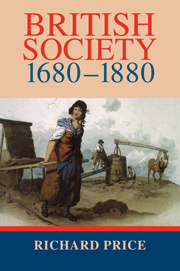Book contents
- Frontmatter
- Contents
- Preface
- Acknowledgments
- Introduction: beginnings, periods and problems
- 1 The economy of manufacture
- 2 A universal merchant to the world: the political economy of commerce and finance
- 3 The ambiguities of free trade
- 4 The reach of the state: taxation
- 5 The age of localism
- 6 The public, the private and the state: civil society 1680–1880
- 7 Exclusion and inclusion: the political consequences of 1688
- 8 Exclusion and inclusion: defending the politics of finality 1832–1885
- 9 The stabilities and instabilities of elite authority: social relations c.1688–c.1880
- Afterword
- Index
9 - The stabilities and instabilities of elite authority: social relations c.1688–c.1880
Published online by Cambridge University Press: 02 December 2009
- Frontmatter
- Contents
- Preface
- Acknowledgments
- Introduction: beginnings, periods and problems
- 1 The economy of manufacture
- 2 A universal merchant to the world: the political economy of commerce and finance
- 3 The ambiguities of free trade
- 4 The reach of the state: taxation
- 5 The age of localism
- 6 The public, the private and the state: civil society 1680–1880
- 7 Exclusion and inclusion: the political consequences of 1688
- 8 Exclusion and inclusion: defending the politics of finality 1832–1885
- 9 The stabilities and instabilities of elite authority: social relations c.1688–c.1880
- Afterword
- Index
Summary
Class, populism and paternalism
How may we understand the nature of social authority in the period of this book? How was elite power secured and maintained? How was consent generated? How were social relations between the classes mediated in the culture, outside the formal structures of law? Merely to ask these questions introduces a series of paradoxes about British social relations during this period. The apparatus of government as it related to social authority was highly localized, deeply personal and, taking the national perspective, weakly deployed. Outside Ireland – a big exception – political and social stability was seldom in question. Yet Britain was not an orderly place. It was, in fact, quite disorderly, as foreign contemporaries frequently remarked and as historians have confirmed. Securing social authority was not blandly unproblematic. Conflict and contention were endemic. Thus, order and disorder among the populace, respect and disrespect for authority and status, strength and weakness of the forces of law and order – all describe the qualities of British social relations.
The conventions and procedures which governed social relations in this period were capable of containing such contradictions. There was a specificity to those social relations that has not been fully appreciated. To the contrary, historians have been constantly tempted to regard the social relations of this period as straining to reach the embrace of the class society of the twentieth century. This is a temptation that it would be well to avoid, but which must be faced before the questions raised at the beginning of this chapter can be approached.
The notion of class is both a hindrance and an asset to the present project.
- Type
- Chapter
- Information
- British Society 1680–1880Dynamism, Containment and Change, pp. 292 - 335Publisher: Cambridge University PressPrint publication year: 1999



